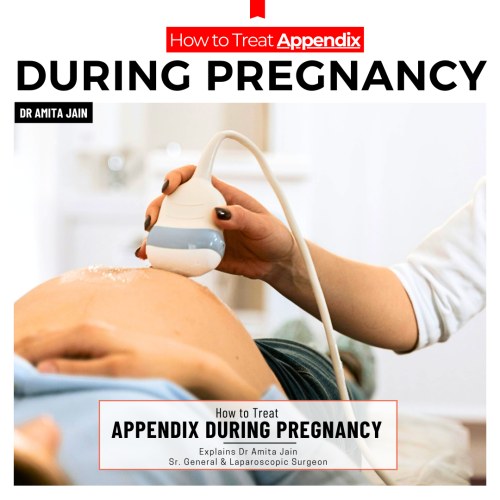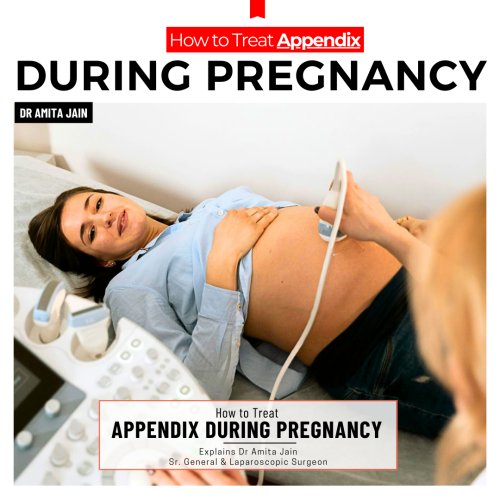Pregnancy is a remarkable journey filled with joy, anticipation, and countless changes in a woman’s body. Yet, amidst this transformative experience, unexpected medical conditions can arise. One such challenge is appendicitis during pregnancy. Appendicitis, the inflammation of the appendix, is the most common non-obstetric surgical emergency in pregnant women.
The difficulty lies in its diagnosis, as many of the symptoms overlap with normal pregnancy. According to Dr Amita Jain, a leading laparoscopic surgeon and one of the specialised surgeons for appendicitis treatment in Delhi and India, a prompt diagnosis and timely treatment are crucial to safeguard both mother and baby.

Understanding Appendicitis in Pregnancy
The appendix is a small pouch attached to the large intestine. When it becomes inflamed or infected, it causes appendicitis. In pregnancy, especially during the first two trimesters, the condition may go unnoticed because symptoms such as nausea, vomiting, and abdominal discomfort are often attributed to normal pregnancy changes. However, untreated appendicitis can lead to a ruptured appendix, infection in the abdominal cavity (peritonitis), and increased risks of preterm labor or foetal loss.
What are the Symptoms to Watch For?
Leading surgeon, specialist for appendicitis in India, Dr Amita Jain, says abdominal pain is the most common warning sign. It often begins near the belly button and shifts to the lower right side. As pregnancy progresses, the appendix moves upward, so pain may be felt in the right upper abdomen or flank region.
Persistent nausea, vomiting, loss of appetite, low-grade fever, abdominal tenderness, and changes in bowel habits may also indicate appendicitis. If such symptoms appear more severe than typical pregnancy discomfort, immediate medical attention is essential.
How is appendicitis diagnosed in Pregnancy?
Diagnosing appendicitis in pregnant women requires extra care. Doctors begin with a detailed medical history and a physical examination. Blood tests, particularly a complete blood count, may reveal infection, though white blood cell counts are naturally higher during pregnancy.
A urine test helps rule out urinary tract infections, which can mimic similar symptoms. Imaging is crucial: ultrasound is the first choice as it is safe for both mother and baby. If results are unclear, an MRI may be recommended, as it provides accurate images without radiation exposure.

What are the Treatment Options for Appendicitis During Pregnancy?
Appendicitis is always considered an emergency. Surgery is the mainstay of treatment, supported by antibiotics and careful monitoring. The choice of surgical technique depends on the stage of pregnancy.
Laparoscopic Appendectomy
This minimally invasive procedure uses small incisions, a laparoscope (camera), and fine instruments. It is generally preferred during the first and second trimesters. The benefits include smaller scars, less blood loss, quicker recovery, and reduced risk of wound infections. However, in later pregnancy, the enlarged uterus can make the procedure technically challenging, and concerns exist about the effects of carbon dioxide used during laparoscopy.
Open Appendectomy
In the third trimester, open surgery is often considered safer. The surgeon makes a larger incision, which allows better visibility of the appendix, especially as it shifts higher in the abdomen. Although recovery is longer and the risk of pain and wound complications is greater, it reduces the likelihood of uterine injury during the operation.
Role of Antibiotics
Antibiotics are given after surgery to prevent infection. The type and dosage are chosen carefully to ensure they are safe for the baby. The duration of therapy depends on whether the appendix had ruptured and the overall health of the mother. Completing the full course is essential to avoid relapse or resistance.
Complications and Special Considerations
Pregnant women are more likely to develop ruptured appendicitis if diagnosis or treatment is delayed. This can lead to sepsis, which endangers both mother and foetus. For laparoscopic surgery, technical care is needed to avoid uterine injury. Despite these concerns, studies show laparoscopy often leads to less pain, quicker recovery, and fewer wound complications compared to open surgery. Importantly, caesarean section is not routinely required when appendicitis is treated during pregnancy.
Key Points for Safe Management
Pregnancy is not a contraindication for laparoscopic surgery. With skilled surgeons and appropriate precautions, both laparoscopic and open appendectomy are safe. Close collaboration between surgeons, obstetricians, and gynaecologists ensures the best outcomes. Every case is treated individually based on the trimester, severity of infection, and the mother’s overall condition.
Appendicitis during pregnancy is a serious but treatable condition. Recognizing symptoms early, confirming diagnosis with safe imaging, and performing timely surgery can prevent complications. Laparoscopic appendectomy is preferred in the first and second trimesters, while open surgery is often safer in the third trimester. Along with antibiotics and multidisciplinary care, these interventions protect both mother and baby. Ultimately, early treatment is the key to ensuring a safe pregnancy journey, even in the face of unexpected surgical emergencies like appendicitis.

Dr Amita Jain is one of India’s most distinguished and experienced senior surgeons who has conducted more than 1,00,000 successful surgeries, and has covered a wide spectrum of general and minimally invasive procedures. Dr Amita Jain is refered as the pioneer surgeon in the fields of Gallbladder stone removal surgery, appendix removal surgery, hernia repair surgery, Pilonidal Sinus treatments, varicose vein and piles surgery, fistula surgery and fissure surgeries.
With an outstanding career spanning over 29 years, Dr Amita Jain has earned her place among the top General and Laparoscopic surgeons in Delhi and India, known for her precision, compassion, and consistent surgical excellence. She was the Professor of Surgery at the Army College of Medical Sciences and Base Hospital, Delhi Cantt. In 1994, she was commissioned as a surgeon under the United Nations Mission in Congo.
Dr Amita Jain currently serves as the Head of Department and Senior Consultant for General, Laparoscopic and Trauma Surgery at Artemis Lite Hospital, Rosewalk – Luxury Maternity Hospital in Delhi (Panchsheel Park, Delhi) and Rainbow Children Hospitals (Malviya Nagar, Delhi).